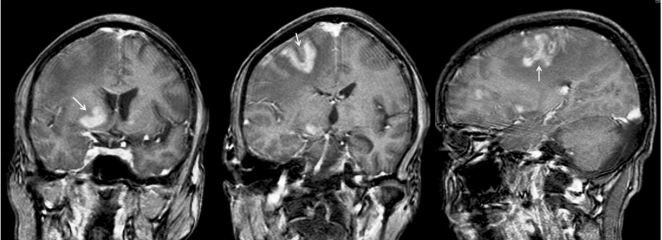Dear Editor:
We read with interest the recently published article "MRI Findings of Primary CNS Lymphoma in 26 Immunocompetent Patients" (1). Dr. Zhang's article is very informative and timely as the incidence of primary central nervous system lymphoma (PCNSL) has been on the rise in both immunocompetent and immunocompromised populations. We agree with Dr. Zhang that PCNSL can demonstrate a variable enhancement pattern on a contrast enhanced MRI study. The presence of a 'notch sign' has been described for the first time in four of the thirty three homogeneously enhancing lesions by the authors. It is a unique and interesting finding, the presence of which could help a radiologist in narrowing down the differentials in patients with suspected central nervous system lymphoma. As the sign has been described for the first time and the study group incorporated only immunocompetent patients, it is difficult to ascertain the significance of this finding in immunocompromised patients with PCNSL. We would like to bring to your notice the presence of a 'notch sign' in a case of PCNSL in an immunocompromised patient. This 40-year-old male patient, a known case of HIV-AIDS, presented with a two-week history of altered behaviour. His CD4 count was 280 and Toxoplasma serology was negative. The other lab markers were non contributory. MR imaging of the brain revealed multiple nodular supratentorial masses involving bilateral basal ganglia, right thalamus, and both frontoparietal regions. These lesions were isointense to the cortex on T1-weighted and T2-weighted spin-echo images. No central liquefaction or differential signal intensity was evident. The lesions were associated with mild-to-moderate perilesional edema. Contrast-enhanced MRI revealed homogeneous nodular post-contrast enhancement in all the six lesions evaluated. Three of these lesions demonstrated a characteristic depression along their outer margins, which is consistent with the 'notch sign' of fore mentioned study (Fig. 1). This patient underwent an open biopsy which confirmed the diagnosis non-Hodgkins CNS lymphoma. This case reinforces the MR imaging finding of a 'notch sign' in PCNSL. The fact that our patient was immunocompromised might suggest that the 'notch sign' is a finding which can be seen in PCNSL irrespective of the immune status. However, the sensitivity and specificity of this sign needs validation in a larger series of PCNSL.
Fig. 1.
Contrast enhanced T1-weighted coronal and sagittal MR images demonstrating depression (arrows) along outer margins of three lesions consistent with 'notch sign'.
References
- 1.Zhang D, Hu LB, Henning TD, Ravarani EM, Zou LG, Feng XY, et al. MRI findings of primary CNS lymphoma in 26 immunocompetent patients. Korean J Radiol. 2010;11:269–277. doi: 10.3348/kjr.2010.11.3.269. [DOI] [PMC free article] [PubMed] [Google Scholar]



